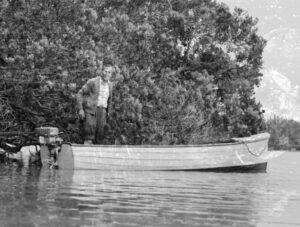
A small boat skims across the surface of a lake, an old man at the helm. His white hair flutters in the wind. He is smiling. The sun is shining. He guides the boat into a quiet alcove and kills the engine and tosses an anchor overboard. He leans over the side of the boat and peers into the emerald water as the ripples disappear and his reflection appears.
A pontoon boat packed with young people from another state buzzes by, music blaring. A girl wearing a pink bikini waves. The old man waves back. When the party barge is gone, the cove is quiet again. The man sits down and closes his eyes. He has time to think, to remember.
Time erodes, the years melt away, and the man is made young again.
***
The water rose a little each day.
I’d go down and look at it every morning, and sometimes I’d try to get Grandpa to go with me, but his answer was always the same.
“Maybe tomorrow,” he’d say.
There was no arguing with Grandpa. He was the most stubborn person in Tennessee, or that’s what Grandma used to say before she died. Grandpa didn’t talk about her much, but I could see it in his face: He missed her as much as I did, or maybe more.
“Why ain’t you at school?” Grandpa asked when I returned from my morning trek.
“There ain’t no school,” I said. “Not until they build a new one.”
“What’s wrong with the old one?”
“They tore it down. Said it was gonna get flooded out anyways.”
“Oh,” was all Grandpa said. We rarely spoke of the rising water. “You gonna go to town and get us something to eat?” he asked.
Going to town was one of my least favorite things to do, but if I didn’t go, then nobody would. Grandpa wasn’t healthy enough to make the trip, but like the lake that was eating our property, we didn’t talk about that either.
“Yeah, I’ll go,” I answered.
“Go back there and get some money.”
I went to Grandpa’s bedroom and dug an old cigar box out of the closet. I grabbed a few nickels and a one-dollar bill and returned the money-box to its hiding place. The money box was getting pretty light. That was another thing Grandpa and I didn’t talk about.
“What should I get?”
“Smoked ham if they got any. And some bread.”
I went to the door, but I didn’t feel good about leaving Grandpa alone, so I took a quick look at him before I slid outside. He was sitting in his big chair, same as always; each day he sank a little farther into the cushions.
I shut the door and hurried around the side of the cabin. Something shiny caught my eye and I paused and stood there, looking down the hill through the trees. I’d lived all seven years of my life on the hill above Cedar Creek, but I’d never seen it rise so high. Time was running out whether Grandpa wanted to talk about it or not.
I ran and didn’t stop until I reached the top of the ridge. I wasn’t looking forward to the long walk to town, but it had to be done. Me and Grandpa couldn’t just sit around and starve.
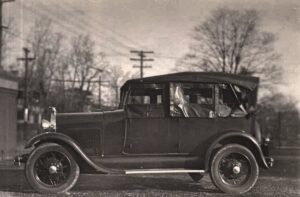
I walked about two miles before Bob Watson picked me up in his Model-A Ford. Bob was one of the only people I was allowed to ride with; him and Grandpa grew up together. The road was bad and the ride was rough, but it beat walking.
The silence in the car was heavy. Something was different. Bob was fidgety.
“Goin for groceries?” Bob asked.
“Yeah,” I answered.
“Your old man still got his heels dug in?”
“Yes, sir.”
“How long is he gonna hold out?”
“Long as he can, I reckon.”
“That don’t surprise me. I don’t know if I’ve ever met anybody more stubborn than your grandpa.”
“That’s what Grandma used to say.”
We rode on.
“What about you?” Bob asked. “What’re you gonna do when that cabin starts floatin?”
“Grab an oar, I reckon.”
Bob chuckled.
I was just repeating what Grandpa always said. I didn’t really know what it meant.
A few minutes later, we coasted off the ridge onto Central Avenue. LaFollette was loud, and there was too much going on, too many faces. I’d never been to Knoxville, but I’d heard people say it was even bigger than LaFollette. I couldn’t imagine. Just thinking about it made me nervous.
Bob pulled over and parked and I got the feeling he wanted to say something else—probably something about the water—but I didn’t want to hear it. It seemed like everybody wanted to talk about the lake, and they just didn’t understand that me and Grandpa didn’t.
“Thanks for the ride,” I said, and jumped out of the car.
Bob said something, but I kept moving. The sidewalk was packed. I shuffled along, darting between men and women, trying my best not to get stepped on.
“They’ll run you over and never think another thing about it,” Grandpa had told me once, and I’d never forgotten. I believed him. With so many people walking along, who would notice if one little boy got squashed?
I hurried inside Woodson’s Grocery and grabbed a loaf of bread on my way to the meat counter. I took a ticket and waited in line just like the other customers. A woman wearing a blue dress looked at me and smiled. I looked away. I didn’t know what else to do. Women looked at me like that sometimes.
After the butcher gave me some ham, I went and looked at the candy. My mouth watered at the sight of so much sugar. I had enough money left over to buy some. Then I thought of the cigar box, and how light it had begun to feel in my hands over the past few weeks.
I left the store with bread, ham, and nothing else.
Two men exploded out of a doorway onto the sidewalk right in front of me. They were swinging their fists and using words I’d never heard before. No one attempted to separate them. I knew at once they’d been drinking—they’d been bitten by the bottle, as Grandma used to say. One of the men managed to get on top of the other and pummel him until he stopped moving. The victorious drunk staggered to his feet, his clothes torn, his hair disheveled. When he noticed how many people were watching, he straightened his shirt and headed down the sidewalk and tried to blend in with everyone else. It seemed to work. Everyone went on with what they were doing and the man disappeared. People stepped over or around the man on the ground.
“They’ll run you over and never think another thing about it.” Grandpa’s words in my head again.
Bob Watson’s Model-A was still parked on the side of the street; Bob was leaning against it, looking around—looking for me, I realized. I tried to blend into the crowd, same as the drunk. It didn’t work.
Bob waved at me. I’m not sure why, but I broke into a run.
“Hey!” Bob yelled.
I darted into an alley and came out on Beech Street and jogged alongside the road, thinking I’d left Bob behind. But it wasn’t long until his car came puttering up behind me. I thought about running again, but decided it was no use. The road was the only way home; walking through the woods would take too long.
Bob cruised along beside me. I stared forward as I walked, clutching the grocery bag against my chest.
“Need a ride?”
“I’m alright.”
“You sure?”
“Uh-huh.”
Other cars were starting to back up behind Bob; I didn’t bother turning around to look but I could hear them.
“I won’t talk no more,” Bob said. “Just get in and I’ll take you home.”
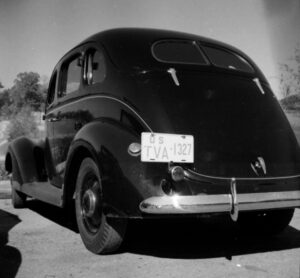
Bob stopped and I climbed in his car. True to his word, Bob stayed quiet. The city shrank behind us. Nothing was said for miles. When we reached the top of the ridge above Cedar Creek, I spotted a car parked on the side of the road beside the bank. It was new and shiny and official looking, and I knew who it belonged to at once: the TVA. I didn’t know how to read, but I knew what those three letters meant. In me and Grandpa’s world, TVA spelled bad news.
Bob stopped.
“Thanks for the ride,” I said.
I started to get out, but Bob grabbed my arm.
“I know I said I wouldn’t talk, but I gotta say something. My wife’ll kill me if I don’t.”
I relaxed into the seat and he let go of me.
“You know my daughter, Emily? Well, her and this feller from Jellico just got married but the doctor says they can’t have no kids.” Bob looked nervous, and he talked nervous. “Anyways, I said that to say this: since my daughter ain’t gonna be havin no kids…well, she knows about you and your situation, and—”
Moving on its own, my hand found the latch and pulled the door open and I bolted. I crashed through the brush beside the road and tumbled down the hill. When I finally stopped falling, I was still holding the grocery bag, but I was dirty, and my right ankle was throbbing. Bob was standing above me beside the road, his hands on his hips.
“What’s wrong with you, boy?” he called.
I rolled to my feet and hurried down the hill. The thought of the men from the TVA being alone with Grandpa scared me. What if they were finally arresting him like they always threatened to? If Grandpa was going to jail, what would happen to me?
Nobody was in the yard, so I crept out of the woods and eased onto the porch. I could hear voices: men talking, serious business from the sounds of it.
“We’ve given you as much time as we can,” one man said. “Unless you leave by tomorrow, you know what we’ll have to do.”
A second man said, “It ain’t thievin, and we ain’t stealin nothin from you or your family. As soon as you vacate this property, you’ll be paid for every inch of it.”
“And if you’re worried about your health,” said a third man, “we can carry you out on a gurney if we have to. It won’t be no big deal.”
“Think about that boy of yours,” said the first man. “You need to do what’s best for him.”
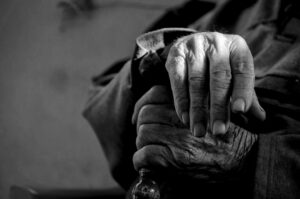
“Don’t you say another word about what’s best for my boy.” Grandpa’s voice was deeper than I had ever heard it.
Something inside me broke. I dropped the bag and burst into the house and landed in Grandpa’s arms. He held me as I cried, both of us in his chair.
“I’ve about had it with y’all comin down here every whipstitch and botherin us,” Grandpa said. “We just wanna be left alone.”
“Yeah!” I yelled through my tears. “Just leave us alone!”
I looked at the men so they could see how much I hated them. They shifted on their feet and looked away.
“We ain’t the bad guys here,” the first man said. “The dam is gonna be a good thing, you’ll see. It’s gonna help everybody.”
“That’s what y’all keep sayin, but I think I’ve got it pretty good already,” Grandpa said.
The three TVA men exchanged glances.
The second man said, “No matter what me, you, or anyone else says, that water is rising.” He pointed toward the creek to emphasize his statement. “We’ll drag you outta here if we have to, and that ain’t a threat. We can’t let you and your boy drown.”
“I can swim just fine!” I shouted.
The men looked at each other again. The first man nodded and the other two men stepped outside.
“We’ll be back tomorrow, and we’ll have the sheriff with us. I hope you’ll come to your senses by then.”
He pulled the door closed behind him.
The men were gone.
Grandpa and I sat there in his chair for a long time. With my head resting on his chest, I could hear his lungs; they sounded dirty, clogged up.
“Will they really arrest you?” I asked.
“No. They’d never do such a thing.”
“How do you know?”
“They were just tryin to scare us. You know how they are.”
I sat there, sniffling, wanting to believe Grandpa. But the men had sounded serious. I believed them when they said the sheriff was coming.
“We can’t stay here, can we?” I asked.
“No, I guess we can’t.”
“What are we gonna do?”
“What do you think we should do?”
“I think we should fight back. We could get your turkey gun, and when they come back tomorrow, we could shoot ‘em.”
Grandpa laughed and it sounded like there was loose gravel rattling around inside his chest. His laugh turned into a cough. After he caught his breath, he said, “We better not do any shooting. Why don’t we get outta here while we still can? Reckon we’ve stayed as long as we could.”
“Alright.”
Later, we ate the food I’d gone to town for, and Grandpa seemed more relaxed than I’d seen him in a long time. He told stories about my mother as we ate, and stories about Grandma.
“Can I sleep with you in your chair tonight?” I asked when it got dark outside.
“You better go on and go to bed,” Grandpa said, so that’s what I did.
I went to my pallet on the far side of the room and laid down. Grandpa began snoring almost immediately. I lay there listening to him until I fell asleep.
***
When I woke up the next morning, Grandpa was gone. He was still sitting in his chair, but the sound coming from his chest had stopped, and his skin was cold. He looked like he was sleeping, but he wouldn’t wake up. I climbed onto his lap and sat there for a long time. I didn’t know what else to do. I heard something happening outside, footsteps and voices.
“This is your last warning,” someone called. “If you don’t leave on your own, we’re gonna come in and drag you out.”
I slid out of Grandpa’s chair and went to the window. The men from the TVA were outside, and they’d brought the sheriff with them just like they’d threatened.
“Why don’t you make this easy and come on out,” the sheriff called.
I opened the door and stepped onto the porch. I was so angry I was shaking.
“That’s a good boy,” one man said. “Now, where’s your grandpa?”
I took a deep breath and said, “You killed him.”
“No, son, we ain’t here to kill nobody. We’re just—”
“You kept comin down here and botherin him and now he’s dead and it’s your fault.”
The men looked at each other, confused. I wanted to fight them, to drive them off our land, but I was just a boy. I couldn’t do anything but make noise.
And run.
I couldn’t fight, but I was fast.
If they wanted me to leave, they’d have to catch me.
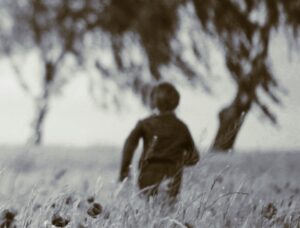
I leapt off the porch and shot toward the treeline, headed downhill. It didn’t take me long to reach the creek. But the creek was gone; it had been replaced by a wide and unmoving lake. The unnatural brown water mocked me; it had drowned my whole world, and I hated it almost as much as I hated my pursuers.
The men were coming down the hill behind me, and I needed to run, but I couldn’t look away from the lake. The water had me hypnotized.
“There he is!” one of them shouted, and I took off again.
I skirted alongside the lake and put the men behind me. I didn’t know where I was going but it seemed like my body did. I ran until I couldn’t anymore. My hands on my knees, my lungs burning, I tried to catch my breath. I looked up and realized where I was: Rough Fork Cemetery, the place we’d buried Grandma.
The cemetery didn’t look much like a cemetery anymore. The headstones were gone and the TVA had dug up all the bodies and moved them to another graveyard above the water line. But they hadn’t bothered to fill in the holes. Headstones or not, I remembered Grandma’s spot. I went to her grave. Seeing it empty broke my heart.
I could hear the men struggling through the brush behind me. It wouldn’t be much longer until they caught me and drug me away. Running was no longer an option. The lake had reached the other side of the cemetery, so I was cornered—men on one side, water on the other. Sure, I could’ve tried to swim, but the thought of getting in that brown water made my skin crawl.
With nowhere else to go, I climbed down into my grandmother’s empty grave. I sat there with my knees against my chest and thought about my grandparents. They were gone. My home was gone. Everything had changed, and there was nothing I could do about it.
The men were shouting somewhere above me, still searching.
The water began to pour in, a muddy waterfall.
It was colder than I thought it would be.
Inch after inch, the water rose.
***
Eighty years after they drug him out of the hole—kicking and screaming, biting and thrashing—the boy, now an old man, sits in his boat. He comes back to Cedar Creek often. Sometimes he fishes. Sometimes he listens to the radio. Sometimes he dozes and dreams of the world he grew up in, the world buried two-hundred feet beneath his boat.
The old man appears to be sleeping, a hat over his face. The sun is setting and the crickets are chirping. Waves ripple across the lake as the other boats hurry back to the docks before dark. The man doesn’t seem to notice any of this. He is somewhere else, and there he decides to stay. He is with his family: his mother, his grandmother, his grandfather. The four of them are together again.
In the cabin on the hill above Cedar Creek, candles burn well past dark, and laughter echoes through the trees until dawn.
The End
Daniel Stetson Ray lives in Jacksboro, Tennessee, not far from the places described in this story. His fiction has won multiple awards, including the James Still Prize for Fiction, and the Jesse Stuart Prize for Young Adult Fiction. He has had stories published in numerous anthologies and magazines. He typically writes short stories of the speculative variety, but has nothing against literary stories or the people who write them.
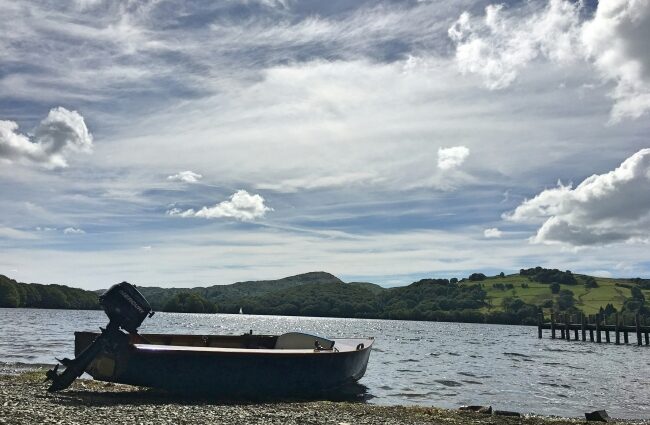



How beautiful. Thank you.
Wonderful, emotional, and deeply affective. Thank you!